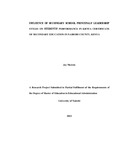| dc.description.abstract | The purpose of this study was to investigate the influence of secondary school principals‟ leadership styles on Kenya certificate of secondary education performance in Nairobi. The study was guided by five research objectives. The objectives sought to determine the extent to which headteachers use of autocratic leadership style, democratic leadership style, situational leadership style and Laissez-fair leadership style influenced students‟ performance in Kenya certificate of secondary education. The study also sought to seek suggestions on how leadership styles could be improved. The study used descriptive survey research design. The target population comprised of 78 headteachers and 989 teachers. The sample size was therefore 24 headteachers and 99 teachers totalling to 108 respondents. Data were collected by use of questionnaires. Data were analysed by use of descriptive and inferential statistics. Findings revealed that headteachers who had adopted autocratic leadership styles had their schools KCSE mean score of between 4.1- 6.0 points. On the other hand, schools whose head had adopted democratic leadership style had relatively higher mean scores of between 6.1 -
9.0. Headteachers who used situational leadership had mixed results; whereby, some schools reported low mean scores while majority reported mean scores of
4.1 – 9.0 points. Based on the findings it was concluded that public secondary schools had adopted situational leadership style. Schools which had adopted situational leadership style had mixed results in the KCSE; findings show that most had achieved mean scores of six points; however, there are also those who performed well while other performed poorly. The study also concluded that democratic leadership style is the second most adopted leadership style among public secondary schools in Nairobi County. Democratic leaders achieved high score in the KCSE; with some achieving means scores of as high as nine points and above. Schools with heads who adopted autocratic leadership style performed poorly. The regression analysis shows a negative but significant relationship between autocratic leadership style and students performance. The study recommended that head teachers should use the most appropriate leadership style that facilitates collective responsibility and consultative decision making with all stakeholders in the schools. The headteachers should also involve the teachers in school administration which would enhance participative leadership and hence better performance. The government should facilitate the head teacher leadership styles through empowerment and training since they have a direct relationship with the student‟s academic performance. The study proposed that leadership styles in public schools could be improved through encouragement of free expression of feelings including criticism among the teachers and staff in general. The study suggested that study on the influences of parental involvement on the pupil‟s performance should be conducted. Lastly a study on the teachers‟
perception of headteachers leadership styles and their motivation to work should be conducted. | en |

